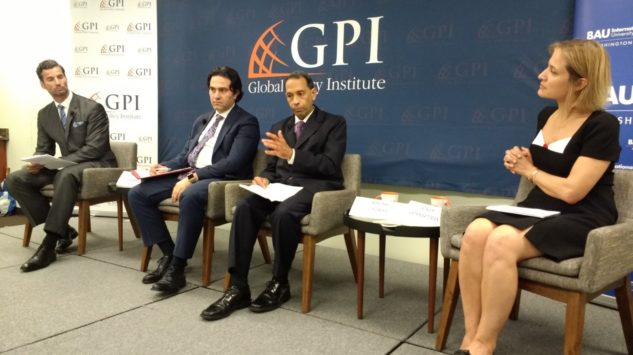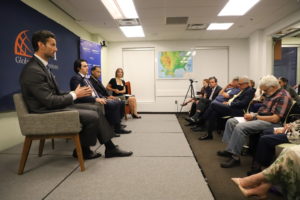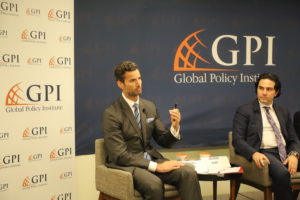Events

U.S. Turkey Relations: Current Challenges and Opportunities
On Tuesday, August 21, the Global Policy Institute, GPI, and BAU International University jointly hosted a panel discussion on: U.S. Turkey Relations, Current Challenges and Opportunities.
The panelists included: Khush Choksy, Senior Vice President, Middle East and Turkey Affairs, U.S. Chamber of Commerce; Selman Kurt, Commercial Counselor, Embassy of Republic of Turkey; and Howard Beasey, President and CEO, American-Turkish Council (ATC). The Moderator was Sinem Vatanartiran, President of BAU International University.
After welcoming remarks by Paolo von Schirach, GPI President, in which he expressed the hope that the awareness of the critical importance of this bilateral US – Turkey relationship will allow both sides to look for constructive solutions to the current disputes, Dr. Vatanartiran led the discussion among the experts. Her questions focused on economic, political and security issues.
The well attended event included The Turkish Ambassador to the US, Mr. Serdar Kilic other diplomats, think tank experts, domestic and international media. All panelists agreed that regarding US – Turkey relations we are now facing a complicated environment featuring the commingling of political differences and economic instruments aimed at obtaining policy changes.
They also agreed that President Trump and President Erdogan have considerable power and leverage in deciding whether to compromise or escalate this dispute. They all expressed the hope that step by step it will be possible to lower the temperature and go back to negotiations aimed at reaching a new accord between the two countries. This was done successfully in the case of Syria where Turkey and the US seemed to have diametrically opposed strategic objectives. In the end, an agreement was reached and tensions have gone away.
Selman Kurt of the Turkish Embassy described Turkey’s economic realities and the current dynamics affecting its currency and economic policies. He also discussed US – Turkey economic relations and how recent US sanctions have affected and may further affect the Turkish economy. Furthermore, he stressed how, prior to the current disputes, bilateral trade and investment flows were poised for significant increases, after years of healthy growth.
Mr. Choksy of the US Chamber stated that the Chamber strongly believes that economic sanctions should not be used to sort out political issues. He also stressed that there is a long history of economic cooperation between the two countries. He pointed out that many US companies, beyond direct investments in Turkey, use Istanbul as Middle East regional headquarters, because of the strategic position of this vast metropolis, right at the intersection between Europe, the Middle East and Central Asia.
Howard Beasey of the ATC pointed out that on account of current tensions there is damage both economic and political for both sides. He also stressed that diplomacy and creative solutions are possible, if both Ankara and Washington fully take into account the strategic value of good US – Turkey relations and the importance of preserving it and strengthening, as a needed anchor of stability in the Middle East Region and beyond.
 |
 |
 |